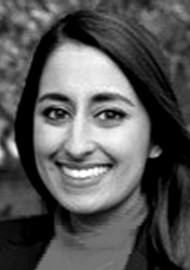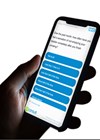What is a leadership fellowship?” This is a question that is often asked about my year out of training to undertake the National Medical Director’s (NMD) Clinical Fellow Scheme. I hope to provide an insight into what a fellowship in leadership and management can offer, share my experiences and what to consider if you are thinking about applying.
For a while, I had been interested in pursuing a leadership experience beyond those incorporated into our daily practice as a urology registrar or a ‘tick box’ course to meet portfolio requirements. Driven by the daily inefficiencies which I had encountered but never fully understood, whilst also witnessing clinical and organisational challenges posed by COVID-19, I wanted a greater appreciation of how our health system works and the role that partner organisations play. I hoped that by stepping out of clinical practice to see the process from concept to delivery, whilst gaining knowledge about healthcare policies and learning from senior leaders, I could better navigate the system as a clinician. I felt that there was limited formal leadership exposure in the training pathway and was therefore keen to join a structured, hands-on programme to translate my natural interest into meaningful change whilst better preparing me for my future consultant post and any formal clinical leadership roles I wish to pursue.

Having discussed my thoughts with a senior colleague, they helpfully recommended the NMD Clinical Fellow Scheme to me. Managed by the Faculty of Medical Leadership and Management (FMLM), it is a 12-month, non-clinical programme established to support doctors in training who have the potential to develop as medical leaders and equip them with the skills required. A unique opportunity to develop my leadership skills whilst working with a national healthcare organisation was hugely appealing. Taking the leap, I applied for the fellowship and was thrilled when I found out I had secured a spot on the scheme, which led me to take an Out of Programme Experience (OOPE) between ST4 and ST5.
Capturing all the incredible endeavours from the fellowship in a few lines is quite the challenge, so I hope that sharing the key highlights will provide a snapshot of my experience. My host organisation was Health Education England (HEE) where I worked within the Directorate of Medical Education and Quality. My first day was exciting but also daunting, with a definite feeling of imposter syndrome. I did not know how things worked or how to perform simple tasks that are alien to someone who has never worked in an office environment. However, I immediately felt like a valued member of the team, and I was surprised at the responsibilities I was given. It was an adjustment getting used to home / office working and the completely different nature and pace of work compared with clinical practice, though I quickly relished this change.
My key projects included the Enhancing Junior Doctor Working Lives programme, where I worked on raising awareness and addressing barriers to less than full time training; this involved meetings with the President of the Royal College of Surgeons and hosting a national webinar attended by almost one thousand doctors in training, in addition to editing and publishing the annual report. I also had the opportunity to organise a national ‘Insight Event’ on the theme of Greener NHS and Sustainability, where I was delighted to host the Chief Sustainability Officer of the NHS and National Director for Transformation at NHS England & Improvement (NHSEI) to provide their expertise in this field. Other projects I collaborated on included the redistribution of specialty training posts, development of an e-portfolio for post-foundation doctors and organising an international education reform conference.
The fellowship was flexible in enabling me to pursue other leadership ventures that interested me, and I chose to seek out some projects relevant to urology. I was lucky enough to be able to undertake some work with the Getting It Right First Time (GIRFT) programme where I worked closely with the Clinical Leads (senior urologists) who quickly brought me on board and provided invaluable mentorship. I gained an understanding of GIRFT methodology, attended ‘deep dive’ meetings of hospital trusts, and was honoured to be co-author of a national strategy document for the recovery and development of urological services post-pandemic.
In addition to project work, the fellowship offered a wealth of additional learning opportunities. Working directly with senior leaders such as Medical Directors, having regular mentor sessions and shadowing board meetings offered one-of-a-kind learning experiences. FMLM also offered a development programme, consisting of educational meetings and networking events.
After completing my NMD Clinical Fellowship, the desire to further my leadership journey led me to embark on another opportunity with Mid and South Essex (MSE) Integrated Care System. I undertook this scheme two days per week alongside less than full time training as an ST5. This involved working closely with the executive team at MSE to lead large-scale transformation projects to meet local and national objectives. For example, supporting the clinical advisory committee in reviewing a proposal to reconfigure the delivery of urology services across three trusts in the region.
By offering a glimpse into my leadership journey, I hope I have showcased the value of these schemes and the transformative impact it has had on my personal and professional growth. I have gained a much better understanding of the NHS landscape and healthcare policy, the role of different stakeholders and how change is implemented in practice. The array of project work has enhanced my strategic thinking, decision making and ability to collaborate, in addition to specific skills such as chairing meetings.
I have thoroughly enjoyed my experience and feel privileged to have had the opportunity to embark on these leadership fellowships. I would encourage anyone interested in leadership to pursue a formal fellowship programme and have put together some of my top tips for those considering applying:
- Pick which scheme is right for you: There are a variety of fellowships available in addition to the NMD Clinical Fellow Scheme. Some of these are completely non-clinical hosted by external organisations whereas others are based in a clinical setting. Examples include The Darzi Fellowship Scheme, Chief Registrar posts and The Future Leaders Programme. I would advise doing some research to compare what they offer and what type of scheme works best for you. Each scheme has its own eligibility criteria and recruitment timeline. For the NMD Clinical Fellow scheme, applications and interviews are normally around December / January time (you can register your interest on their website to be informed of key updates).
- Decide if you want to take an OOPE: There are pros and cons of taking a year out of training versus pursuing a leadership opportunity alongside training. Having done both, an OOPE enabled me to fully immerse myself in the experience of working in a completely different environment though this time did not count towards training. During my second fellowship, it was challenging juggling non-clinical and clinical work, however I enjoyed the diverse workload it offered.
- Early and close communication with your educational supervisor and training programme director (TPD): If taking an OOPE, you must apply for this prospectively and there are certain application windows, so it is important to make sure you know when these are and become familiar with the necessary paperwork. Discuss your intentions with your supervisor and TPD well in advance. My experience was that they were extremely supportive.
- Do not be put off when applying because you are worried about lack of experience: The application process consists of a written application and if shortlisted, an interview. I was convinced that I would never be successful given that I did not have any fancy leadership or management experience. Nonetheless, it is important to remember that you will have a lot of leadership experience through your day-to-day practice (e.g., theatre, multidisciplinary teams, mentoring juniors) and portfolio work (teaching, audits, etc). If you show you are motivated and keen to learn, you are in with a chance.
- Talk to as many people as possible: Talk to people who have done a leadership or management fellowship as they will provide valuable insights. Including myself! I am more than happy to be contacted to discuss anything further or answer any questions.








